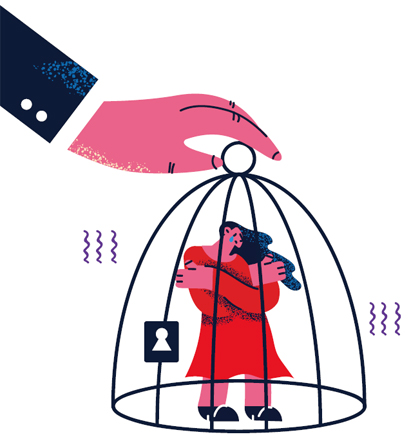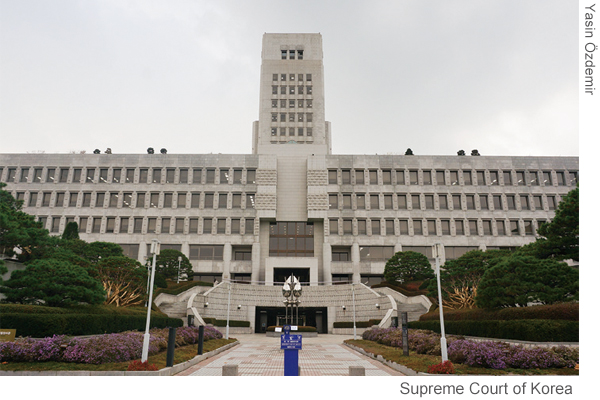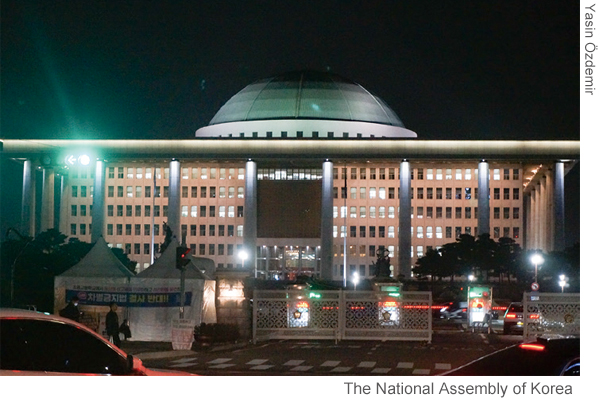
In June 2019, Lee Eun-hae was arrested and indicted on charges of killing her husband, with the help of Cho Hyun-soo, in a valley in Gapyeong-gun, Gyeonggi-do, for life insurance money. In the first trial on October 27, 2022, Lee Eun-hae, the main culprit of the “Valley Murder Case,” was sentenced to life in prison. Cho Hyun-soo, the accomplice, was also sentenced to 30 years.
In addition, the court ordered them to attach location-tracking electronic devices for 20 years after the end of the prison term and imposed restrictions on going out and residence during the attachment period. A key issue in the trial was whether the method of murder was gaslighting or not. The prosecution indicted the case, saying it was a murder that drowned the victim by gaslighting him.
In this case, however, the court concluded that the defendants’ action was not “murder by action” that killed the victim by having him jump into the water, but was “murder by omission,” which means that they did not properly implement relief measures even though they recognized that the victim could die if they left the drowning victim alone. Even though the court did not see the crime as a murder by gaslighting, this case reflects how seriously people perceive gaslighting crimes now.
What Is Gaslighting?
Gaslighting crimes have frequently been occurring, especially these days. Gaslighting refers to words or actions that manipulate the others’ minds of others. It is a type of brainwashing that makes people doubt their own judgment, making them completely reliant on another. Most people think this term as a psychological term, although it is not an academically acknowledged term. It is rather a buzzword. The play, <Gaslight>, directed by Patrick Hamilton, is the origin of this word. It tells the story of a man named Jack manipulating his wife’s mind to suppress her to hide his murder.

Gaslighting can be especially dangerous due to its traits. The most noticeable difference between gaslighting and other psychological control methods is that gaslighting makes one doubt self-judgment. It injects negative perceptions that one’s words are foolish and wrong while a perpetrator’s are undoubtedly correct. In addition to deliberate gaslighting, someone can unconsciously be gaslighted in everyday life without recognizing it. Moreover, the range in which gaslighting takes place is extremely wide. Gaslighting can occur not only in relationships with lovers and friends but also at home. Thus, the traits of gaslighting make people get fooled much more easily than other types of spiritual control.
Robin Stern, an American psychologist who established the definition of gaslighting, divided gaslighting into three stages. The first step is “distrust,” where the perpetrator puts strong psychological pressure on the victim, and the victim begins to doubt his or her behaviors or values. The next step is “self-defense.” It is the stage in which the victim defends that it is not the case with the perpetrator’s claim that he is wrong.
Robin Stern also defined the act of proving that they were not wrong as a sign of being gaslighted. The last step is “suppression.” In the final stage of gaslighting, the victim gets overwhelmed by the perpetrator and becomes mentally controlled, sympathizing with the perpetrator’s opinion without judging on his or her own judgement. In her book [The Gaslight Effect: How to Spot and Survive the Hidden Manipulation Others Use to Control Your Life], she emphasized the danger of gaslighting, which mostly occurs in close relationships.

On October 7, 2021, a petition was posted titled, “I demand the punishment of a noncommissioned officer who killed my sister by gaslighting.” The petitioner, who identified herself as the victim’s older sister, claimed that the victim committed suicide because of gaslighting. The petitioner checked the victim’s phone and found that the victim’s noncommissioned officer interfered excessively in the victim’s life with continuous gaslighting under the pretext of love. Her sister even had to be confirmed to buy clothes and talk to her friend. The noncommissioned officer manipulated the victim’s psychology by consistently telling her he was the only one who could love the victim.

There was also a case of a woman who suffered from assault and abuse for more than 10 years. The victim and perpetrator met each other as a student and a tutor when the victim was in middle school. They continued their relationship even after the victim became a college student, and gaslighting began from this point. The perpetrator continued to reveal the victim’s unfortunate family matter and alienated her relationship with his parents. The victim stated that she initially hated gossiping about her parents but was convinced by consistent gaslighting. After that, the victim became completely dependent on the perpetrator, who cut off the victim’s contact network and isolated her socially, depriving the victim of a phone. The perpetrator assaulted and inhumanly abused the victim by feeding her food waste.
As such, gaslighting crimes have become a huge problem in recent years. The biggest danger in gaslighting is the blurred judgment of the victims which can make it hard for them to recognize what is wrong. The above two cases also show how dangerous it is. Gaslighting crimes become more vicious and difficult for victims to escape the situation.
The UOS Times interviewed student A who had been getting gaslighted in the past, to show the impact of gaslighting.
Q. Have you ever experienced gaslighting before? If so, share your experience.
I met with her three years ago, and our relationship lasted for two years. At first, everything was fine, and I felt thrilled to be with her. Then, we started to fight over really small and unimportant things, and she started to tell me things like, “you do not love me at all; you hate me.” At first, I thought she was having a bad week, but her way of talking did not change even after a month had passed. The things she started to say to me and the way she talked to me became more abusive day by day. She would get mad at me when I did not respond to her “fast enough” or wanted to sleep before she did. When I talked about it, she got even more aggressive by saying, “Do you think I am a person like that?” which made me question my sanity and feelings.
Q. How has that experience affected your life?
I was a person who enjoyed everything in life. I was feeling happy; I had friends, hobbies, good habits, and a good sleeping schedule before things started to change. I lost all of my good friends because of her, I lost interest in anything in the world; I gained weight, and most importantly, my mentality changed. In the past, I used to sleep so easily and wake up happily in the morning, but after getting gaslighted by her, I developed insomnia. I do not remember the last time I woke up feeling happy. I lost my trust in myself and no longer go out properly nor socialize with people. She cost me my life.
Q. If gaslighting was a crime with proper punishments, would you press charges?
If I had a chance, I would like to press charges for what she had done to me. However, what she did to my mentality is not considered a crime. Even if it was a crime, I think it still would be hard for me to press charges as a man. Society, in general, wants me to be “strong,” and I think I would get societal backlash for going to the police. Another thing is that, just like I said, she created a different persona of herself for others, so I think it would be impossible to make anyone believe in me. I wish people knew more about gaslighting to help the people in need near themselves.
Q. What do you want to say to people who are still getting gaslighted?
Do not try to be reasonable with the perpetrator. The perpetrator is already out of touch. Save yourselves from the perpetrator’s life as soon as possible, and please, do not feel shy to talk to other people. You are not doing something wrong; you should not be alone during all of this. First, talk with the people you trust the most and then get some psychological help fast. These hard times will pass as well. I hope no one faces gaslighting in their lives.

Korea’s legal system, just like the rest of the world, follows the mentality of “Nulla poena sine lege” (no penalty without law, in English). It is a legal principle that states that one cannot be punished for doing something that is not prohibited by law. Due to this fact, crimes of gaslighting can only be used as a reference in the investigation stage for other crimes such as abuse, deliberate murder, and extortion.

Under Korean law, if gaslighting can be evaluated as a harsh treatment that inflicts physical and mental pain on the victim, it can be punished as a crime of abuse (Criminal Act Article 273.) If violence is involved, it can be punished as an assault crime (Article 260,) and if it has been conducted habitually, the punishment can be increased by 50 percent. In the case of threatening to harm the victim, it is punishable as a crime of intimidation (Article 283.) Illegal confinement or extortion crimes may also be invoked against the gaslighting perpetrator (Articles 276 and 350.)
To fight against gaslighting and to raise awareness of this issue, court cases are very important. However, regarding gaslighting, there are many chances for a perpetrator to avoid prosecution due to insufficient evidence. To report a perpetrator in Korean justice, it is necessary to obtain evidence by cooperating with friends and family, recording or taking pictures of the perpetrator’s unusual remarks or actions when the circumstances of gaslighting appear clear. These requirements to report a gaslighting case to court make things harder for people who are already experiencing serious problems in their lives.
In the case of the UK, the government announced in 2015 that a “new coercive or controlling behavior offense” will mean victims who experience the type of behavior that stops short of serious physical violence but amounts to extreme psychological and emotional abuse can bring their perpetrators to justice. The offense carries a maximum of five years imprisonment, a fine, or both.
To combat gaslighting, political measures should first be presented to the public to recognize the seriousness of gaslighting crimes and provide education to prevent damage. Just like in the UK, extreme psychological and emotional abuse should also become a reason for prosecution. Yet, not only that, but the legal concept of mental control should also become a crime, even if there is no physical violence. Just like any other social issue, gaslighting also requires much public awareness to eliminate. Gaslighting should become a crime that can be punished and discouraged at all costs. Articles like this offer great opportunities to raise awareness since only one candle is enough to brighten the darkest night.
Lee Seung-bum
okok3037@uos.ac.kr
Yasin Özdemir
yasinozdemir@uos.ac.kr

